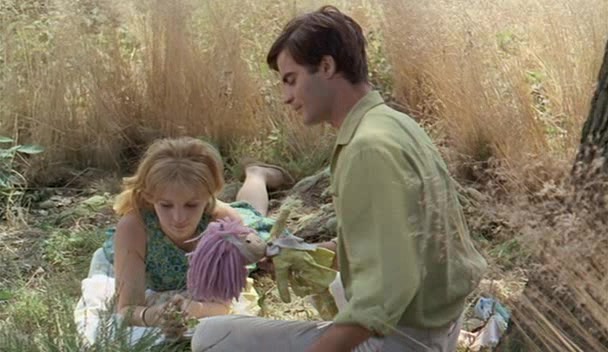
Le Bonheur belongs to a very specific category of film usually found in great director’s filmographies. It’s the kind of film that doesn’t see the director necessarily doing the most ambitious work, but still sees them tackling a bunch of thought-provoking ideas while perhaps not firing on all cylinders, but firing on most cylinders. It’s a hard type of film to criticize, since it’s, for the most part, charming. Though I suppose a film described as “charming”, usually means its slight. I’m not sure slight is how I’d describe Le Bonheur, but it still feels like a minor work from Agnès Varda. It’s just that her minor work appears to still be fraught with interesting ideas and ways of expressing them.
“Le bonheur” translates to “happiness” in French, and the film begins with a family that seems to be filled with plenty of it. François (played by Jeane-Claude Drouot) is a very handsome carpenter with an equally pretty wife, Thérèse (played by Drouout’s real life wife, Claire Drouout) who have two kids (played by the actors’ real-life kids). They seem to live a carefree existence, filled with lots of hanging out in fields and living that laid-back French lifestyle. However, one day François is at the post office when he meets another, less sandy blonde named Émilie. Hmmm… after Floating Weeds I just realized this is my second movie in a row in which a post office worker plays a pivotal part in the story.
Anyways, François makes flirtatious conversation with Èmilie each time he comes to the post office, and eventually, they sleep together. However, François expresses that he’s not doing it because he’s grown unhappy in his marriage, and that he’s still completely in love with his wife Thérèse. So, he decides that he’ll tell Thérèse that he’s found this new lover, but that he plans to stay in a committed marriage while also tending to this new relationship. Which, despite Thérèse’s initial approval of the situation, doesn’t turn out exactly as François had anticipated.
I suppose the first thing that is striking about this movie, and I’m sure was a bit shocking at the time, is how matter-of-factly sex is treated in this movie. There’s nothing over-stylized about the sex scenes, and there’s also nothing overtly moralistic about how this extramarital affair is treated. Granted, it’s not something that’s going to blow your mind watching it nowadays, considering there are literally a million different ways to watch people having sex without being judged. But, the film is still a bit ahead of its time, since it feels very much like a ’70s movie, both in its casual nudity, but also in its loosey-goosey, plotless storytelling.
I’m sure someone not male could probably dissect this aspect of the film much better than I, but the gender politics of the movie are interesting coming from a female perspective. Le Bonheur does pretty much depict a certain male fantasy, and though this fantasy doesn’t go exactly as planned, he does kind of get off scott free for his sexual indiscretions. As I mentioned earlier, Varda doesn’t really villainize or judge François, or either of his partners, which I suppose could be read as some commentary on the budding sexual revolution knocking at the gates of the late ’60s. But maybe I was looking for a little more to chew on in regards to what makes a man commit adultery.
For a film that was supposedly conceived and filmed in a fairly short amount of time, the technical prowess of Le Bonheur is pretty intoxicating. Seeing a film with the French New Wave aesthetic in color is always pretty arresting, as it has all the jump cuts and stylistic playfulness associated with this movement. But it’s still sumptuous in its use of yellows and greens, combined with the compositions of Mozart serving as its soundtrack. I’m sure it’s entirely possible that there are more worthy Varda movies worth exploring, considering I haven’t seen a ton of them. But since her films aren’t nearly as canonized as her male contemporaries, I just kinda chose this one at random. Still, the Varda touches are starting to become more obvious with each film of hers I see, and though she passed away earlier this year, at least her films are still with us to help spread the happiness around.
Note: I’m sure I could have fit a “le boner” joke into the plot synopsis, but it just seemed a little too easy.


